Book Reviews: A Look at Five Recent Works of Fiction by Women
By Roberta Silman
Here is a composite review of some recent fiction by women. Some are more successful than others, but all are worth a look.
Lies and Sorcery, Elsa Morante. Translated by Jenny McPhee, New York Review of Books, 775 pages, $24.95
Absolution, Alice McDermott. Farrar, Straus and Giroux, 324 pages, $28
Normal Rules Don’t Apply, Stories, Kate Atkinson. Doubleday, 206 pages, $28
We Must Not Think of Ourselves, Lauren Grodstein. Algonquin Books, 296 pages, $27
At the Edge of the Woods, Kathryn Bromwich. Two Dollar Radio, 220 pages, $26.
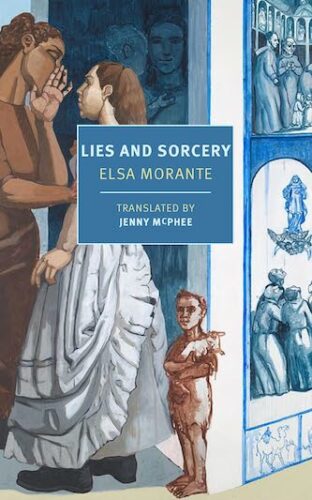
During a very busy summer and an equally busy fall, five books of fiction arrived here in the Berkshires that I could not ignore, for varying reasons. And when I thought about reviewing them, I realized that instead of concentrating on each one, I could do a composite review that takes a look at recent fiction by women. Some are more successful than others, but all are worth a look. And they exemplify an amazing range of interests — something that has always interested me, especially when readers ask me: How do you decide what to write a novel about?
I will start with the book that has gotten mostly fabulous reviews, by the almost famous Italian 20th-century writer Elsa Morante, who was married to the famous Alberto Moravia. Her debut novel was published in Italian in 1948 as House of Liars and garnered comments like “the greatest modern Italian novel,” from Gyorgy Lukacs and “spellbinding” from Stephen Spender. I am not sure if they read it in the original or in a shortened version translated into English as House of Lies, which was released in 1951. Morante has also been acclaimed as an influence on Natalia Ginzburg and Elena Ferrante, whoever “she” is. For the record I insist that Ginzburg is a far better writer than either Morante or Ferrante.
Morante was disappointed in the original English translation, and now we have a complete, unabridged version of her novel, entitled Lies and Sorcery and translated by Jenny McPhee. It runs to almost 800 pages. I am sorry to say that I found it turgidly written, bloated in conception, repetitious, and singularly unconvincing. I know that the narrator Elisa is a liar and unreliable, but I have read enough novels with unreliable narrators to know that they can be compelling — for example, The Good Soldier, Ford Madox Ford’s masterpiece. Moreover, Elisa and her story move along with a sluggishness I have rarely encountered. Set in Sicily, Elisa is looking back on her life; she was orphaned at 15 and lived with a “protectress,” who, she now realizes, was a prostitute. As she tries to reconstruct her own history, as well as that of her ancestors, she delves into her family’s dark past — filled with more lies and treachery — in an attempt to connect with reality and truth. There are flashes of wonderful writing but, in the end, the narrative is buried in mounds and mounds of detail: too many of the same stories are told from different perspectives, and there are too many words. At least for me. But those of you who have loved Ferrante — and you are many — may feel differently about this book. Which is why I have called it to your attention. For those who are not in love with Ferrante, you might want to read or reread what I consider the 20th-century Italian fiction masterpiece: Giuseppe Lampedusa’s The Leopard.
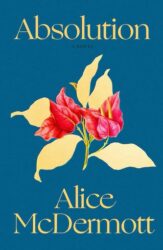 Alice McDermott is a very talented American writer now in her 70s. You may know her from At Weddings and Wakes, Charming Billy, Someone, and my favorite, After This. Her protagonists are usually good Catholic girls, of Irish descent, who are facing enormous changes in the culture, and her writing is often exquisite. For years I have longed for her to write a more ambitious novel, perhaps presented on a larger stage than her usual settings: Manhattan and its outer boroughs. So when I read that Absolution is about Vietnam in 1963 and its narrator is the wife of a contractor to the military as the war is gearing up, I opened the book with great anticipation. And on the first page, a promising beginning: “You have no idea what it was like. For us. The women, I mean. The wives.” But this new novel breaks no new ground. Once again, the plot revolves around a good Catholic girl, Tricia. This time around the protagonist is trying to get pregnant and becomes prey to the leader of the pack, a bully named Charlene. It is Charlene who jumps off the page, but remains too opaque and too cunning to root for. So we are left with Tricia, although she seems unbelievably resigned and passive for someone so young; indeed, a general spirit of weariness pervades this book.
Alice McDermott is a very talented American writer now in her 70s. You may know her from At Weddings and Wakes, Charming Billy, Someone, and my favorite, After This. Her protagonists are usually good Catholic girls, of Irish descent, who are facing enormous changes in the culture, and her writing is often exquisite. For years I have longed for her to write a more ambitious novel, perhaps presented on a larger stage than her usual settings: Manhattan and its outer boroughs. So when I read that Absolution is about Vietnam in 1963 and its narrator is the wife of a contractor to the military as the war is gearing up, I opened the book with great anticipation. And on the first page, a promising beginning: “You have no idea what it was like. For us. The women, I mean. The wives.” But this new novel breaks no new ground. Once again, the plot revolves around a good Catholic girl, Tricia. This time around the protagonist is trying to get pregnant and becomes prey to the leader of the pack, a bully named Charlene. It is Charlene who jumps off the page, but remains too opaque and too cunning to root for. So we are left with Tricia, although she seems unbelievably resigned and passive for someone so young; indeed, a general spirit of weariness pervades this book.
The narrative also shifts from Tricia in the first person to the second person when Tricia writes a letter years later to Charlene’s daughter Rainey. And then Rainey shares a coincidence — which I found not credible — which is supposed to shed light on that exciting yet confusing time in Vietnam. Perhaps the choice to tell part of this story in the second person, addressing an amorphous “you,” is part of the problem. I don’t know.
And I am clearly a minority of one. This novel has gotten wonderful reviews, several critics calling it McDermott’s masterpiece. Moreover, there are some terrific descriptions of Tricia and Charlene’s engagement with the Vietnamese people, especially in a leper colony. And McDermott does address the tricky moral questions that are inevitably embedded in any form of altruism, especially when it is combined with colonialism. Yet, in the end, Absolution does not achieve the urgency or the breadth of vision I had hoped for. This was a crucial time in American history — a time filled with opportunities for more compelling drama and higher stakes than we have here.
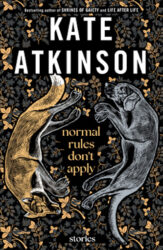 As most of you know, I am a huge fan of Kate Atkinson’s novels Life After Life and God in Ruins. They are superb books about the Todd family in England during and between the two World Wars. She has also written some wonderful detective novels about a man named Jackson Brodie, as well as a new novel about the music hall life in the 1920s called Shrines of Gaiety. Indeed she is so versatile that it is hard to pin her talent down, and now we have a collection of 11 stories, written over the last 20 years, called Normal Rules Don’t Apply. Here she is interested in the intersectionality of this world and the next; Atkinson’s strategy is to blend fairy tales and reality, and to connect these tales she revels in the sometimes hilarious, sometimes poignant adventures of an engaging loser named Franklin Fletcher. Hovering over these stories is the spirit of Ursula LeGuin as well as Atkinson’s wildly talented forebear, Angela Carter. There are queens and talking animals and people who are reporting from eternity; there is a villainous family that frames Franklin, and another in which a sad widowed woman undergoes a form of immaculate conception. Then there is my favorite, Mandy, who has died and is now trying to navigate the next world. Other characters include Skylar, an American movie star who is on location in the middle of nowhere England working on a soap opera, and Kitty, who works for a hedge fund and is imagining a parallel world. If it sounds dizzying, it is.
As most of you know, I am a huge fan of Kate Atkinson’s novels Life After Life and God in Ruins. They are superb books about the Todd family in England during and between the two World Wars. She has also written some wonderful detective novels about a man named Jackson Brodie, as well as a new novel about the music hall life in the 1920s called Shrines of Gaiety. Indeed she is so versatile that it is hard to pin her talent down, and now we have a collection of 11 stories, written over the last 20 years, called Normal Rules Don’t Apply. Here she is interested in the intersectionality of this world and the next; Atkinson’s strategy is to blend fairy tales and reality, and to connect these tales she revels in the sometimes hilarious, sometimes poignant adventures of an engaging loser named Franklin Fletcher. Hovering over these stories is the spirit of Ursula LeGuin as well as Atkinson’s wildly talented forebear, Angela Carter. There are queens and talking animals and people who are reporting from eternity; there is a villainous family that frames Franklin, and another in which a sad widowed woman undergoes a form of immaculate conception. Then there is my favorite, Mandy, who has died and is now trying to navigate the next world. Other characters include Skylar, an American movie star who is on location in the middle of nowhere England working on a soap opera, and Kitty, who works for a hedge fund and is imagining a parallel world. If it sounds dizzying, it is.
I must confess that when I first read these stories I thought some of them were too clever by half. But then a voice told me to read them again, and I began to realize that, in addition to her wildly inventive bent, Atkinson is also a brilliant satirist. Her observations on English society are sharp and indelible, her literary allusions are legion yet never condescending, and her prose is crisp yet intimate, zinging the reader along on adventures that make Alice’s descent into the rabbit-hole look tame. Here is a truly dazzling collection that pushes the imagination — the writer’s and the reader’s — into territory well worth exploring. An example is the divorced Pamela reviewing her situation:
If she had her time over again, she wouldn’t bother with university, certainly wouldn’t bother with Colin (her ex), she would go straight from school to Paris. Sit in Cafe de Flore smoking Gauloises while sipping tiny espressos or little glasses of milky Pernod. And then lie languidly in the warm, rumpled sheets of a bed in a garret with a view of the city’s rooftops, a lover by her side. This vision was based on an Opera North production of La Boheme that she had seen years ago. Art was dangerous, it gave you ideas.
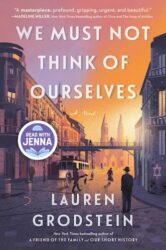
Just when you think you will never be interested in reading another book about the plight of the Jewish people during the Second World War, you receive a volume with an entirely new take on that shameful time in world history. This year it is by Lauren Grodstein and entitled We Must Not Think of Ourselves. Its genesis is interesting. Grodstein, who teaches creative writing at Rutgers and is the author of several novels, visited the Oneg Shabbat Archive in Warsaw, where eyewitness documents relating to the Warsaw Ghetto are stored. From that visit she imagined this strange and appealing novel about life in the ghetto during the early years of World War II. It begins in 1940 with a young widower named Adam Paskow who is now a prisoner and a teacher in the ghetto:
The man came to my classroom on December 14, 1940, at 4:40 pm. I wrote down the time and date immediately, because he asked me to write down everything immediately, and there was no reason not to comply. “All the details,” he said, “even if they seem insignificant. I don’t want you to decide what is significant. I want you to record. You are a camera and a Dictaphone, both.”
He was tall, with brown curly hair that seemed clean, newly cut. He had heavy brows, hooded eyes, and a sharp nose, and all in all was handsome in a rather somber way. He spoke educated Polish with an eastern accent. His name was Emanuel Ringelblum …
“And we do this … why?” I asked. Very few of us here needed more to do.
“It is up to us to write our own history,” he said. “Deny the Germans the last word.”
A dry chuckle escaped me. “It’s hard to deny the Germans anything, Pan Ringelblum.”
“Perhaps,” he said. “Or perhaps after the war, we can tell the world the truth about what happened.”
So Adam obeys and bears witness to his two years in the ghetto. He observes his students, his neighbors, his friends, and learns about their pasts and their hopes and dreams. And then he reveals to the reader what he has learned in the form of small sketches, vignettes from their lives, scenes that might have been parts of a play. Grodstein’s method creates a sense of intimacy that is always the mark of good fiction, and slowly we absorb Adam’s plight in the same real time as he is living it; we see him grow to care for the children who surround him, we learn about his early life as a secular Jew, his marriage to the Christian woman Kasia, their unfulfilled longing for a child, her migraines, and her untimely death in an accident.
Yet he cannot indulge in too much mourning. He takes his vow to witness seriously, and we learn about the children who now surround him: their incredible resilience and need to survive. We also learn how he sustains himself with his memories and the poems he loves. Our eyes fill with tears when he tries to distract his pupils from their meager existences by teaching them that old favorite, “The Owl and the Pussycat;” we marvel at his persistently brave effort to exchange one of Kasia’s necklaces for the papers he needs to escape. We also mourn with him at the deaths that mount up around him, and we share his astonishment both at the rare good German and the rare traitorous Jew. And finally, we watch him fall in love with Sala, one of the women with whom he shares an apartment — a wife and mother whose resilience sustains him as he makes the hardest choice of his life toward the end of the book.
This is a novel filled with humor and compassion and tenderness. A book that allows you to see into a time and place that was filled with vitality and ingenuity and loyalty, as well as cruelty and betrayal and bestiality. A book about people caught by fate and forced to live on the edge of death. A book that is a worthy addition to what is called — for want of a better name — Holocaust literature.
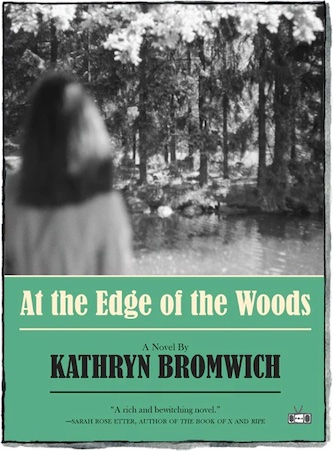 I will end with At The Edge of the Woods, published by a small company called Two Dollar Radio, who sent it to me with a personal letter exhorting me to read this debut novel by Kathryn Bromwich, a young Englishwoman. Bromwich is now an editor at the Observer in London, but she drew on her knowledge of Italy (she has an Italian father) to write this beauty of a novel about a young woman who seeks solitude in the Italian Alps in an attempt to regain her identity, to figure out how she got where she is and what she will do next.
I will end with At The Edge of the Woods, published by a small company called Two Dollar Radio, who sent it to me with a personal letter exhorting me to read this debut novel by Kathryn Bromwich, a young Englishwoman. Bromwich is now an editor at the Observer in London, but she drew on her knowledge of Italy (she has an Italian father) to write this beauty of a novel about a young woman who seeks solitude in the Italian Alps in an attempt to regain her identity, to figure out how she got where she is and what she will do next.
The trajectory is simple: Laura decides to leave her life and rents a small cabin in the mountains. Slowly she records her smallest activities as she adjusts to a life of solitude and simplicity. She makes whatever money she needs by translating medical documents and tutoring the children of the local village. She also becomes involved romantically with a waiter several years younger than she. And she stays in touch with a friend. But what she really learns, to her delighted surprise, is the power of the natural world to help heal a wounded spirit. Here is an example of her precise and appealing prose:
The cold is so extreme it feels clean, purifying. It stings my eyes and face like invisible daggers, though it is more bearable than the wet autumn days in which the moisture seemed to seep into my bones. My walks become more vigorous, dictated by the need to keep my limbs moving and warm blood running through me. As the weather worsens, my routes become more contained; the risk of sudden blizzards too great. My world becomes smaller, harsher, and yet ablaze with possibility, slave only to the rules of the mountain.
However, the past eventually intrudes, and when it does Laura is ready to reveal to the reader what she has gone through and why she is here. As she delves into her memories, her behavior becomes more erratic, causing the villagers to view her with suspicion. Events become more complicated, but even as she endures them Laura gains more and more insight into who she is, and why.
This is a prose poem of a novel, somewhat reminiscent of Eight Mountains by Paolo Cognetti, which in 2022 was made into a movie. It is a meditation as well as a story, a look into a complicated mind that seeks calm and truth. What, ultimately, we all do. I was especially moved by the way Bromwich entwines the story of Laura, a young woman seeking solace, with her surroundings. The weather and terrain are sometimes harsh, but they give her the nourishment she requires. We depend on the natural world to sustain us, but it is very hard to convey that need without resorting to maudlin sentimentality, Or boring litanies about dark mysteries in the forest or the way the light changes on the mountain. To do it well requires a rare talent for observation and an equally rare talent for choosing the exact details. This young writer has a talent for both, and she has written a superb first novel that will stick in your mind long after you have read the last page.
Roberta Silman is the author of five novels, a short story collection, and two children’s books. Her latest, Summer Lightning, has been released as a paperback, an ebook, and an audio book. Secrets and Shadows (Arts Fuse review) is in its second printing and is available on Amazon. It was chosen as one of the best Indie Books of 2018 by Kirkus and it is now available as an audio book from Alison Larkin Presents. A recipient of Fellowships from the Guggenheim Foundation and the National Endowment for the Arts, she has reviewed for the New York Times and Boston Globe, and writes regularly for the Arts Fuse. More about her can be found at robertasilman.com, and she can also be reached at rsilman@verizon.net.
